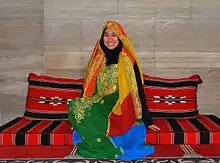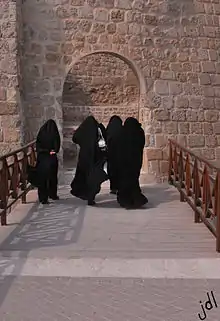Women in Bahrain
Women in Bahrain are generally more publicly active than women in other Arab countries. They are highly educated, and are represented in all the major professions, women's societies, and women's organizations. They have the right to vote, and around one-quarter of women in Bahrain hold jobs outside of the household.[2] Bahraini Women's Day is annually celebrated on December 1.[3]
 A Bahraini woman in traditional wedding garb | |
| Gender Inequality Index | |
|---|---|
| Value | 0.258 (2012) |
| Rank | 45th |
| Maternal mortality (per 100,000) | 20 (2010) |
| Women in parliament | 18.8% (2012) |
| Females over 25 with secondary education | 74.4% (2010) |
| Women in labour force | 39.4% (2011) |
| Global Gender Gap Index[1] | |
| Value | 0.627 (2018) |
| Rank | 132nd out of 153 |
Traditional Attire
.jpg.webp)

The traditional garments of women in Bahrain include the jellabiya, a long, loose dress, which is one of the preferred clothing styles for the home. Bahraini women may practice the muhtashima, partially covering the hair, or the muhajiba, fully covering the hair.[4]
Roles in society
| Part of a series on |
| Women in society |
|---|
 |
In the past, such as in the 1960s, the roles of Bahraini women depended on the roles or jobs of their husbands. Women married to fishermen were expected to assist their husbands in their trade as fish cleaners and fish vendors. Women married to farmers were expected to act as farmland helpers and as produce marketers. In towns and cities, women were traditionally assigned to do the house chores and taking care of children. Wealthy Bahraini women, in general, would employ servants to perform their daily chores for them.[4] In addition, women of Bahrain are renowned for their expertise in traditional textile embroidery. This talent of Bahraini women is a reflection of the Bahraini culture and heritage.[5]
During the last thirty years or so, women in Bahrain have had opportunities to deviate from conventional female roles in society. They were able to expand their roles and achieve careers in the fields of education, medicine, nursing practice and other health-related jobs, financing, clerical jobs, light manufacturing, banking profession, and veterinary science, among others.[4]
In Fact, Bahrain is the first GCC country to have women in high government rankings and roles, representing the government, such as ministers and ambassadors.
Role models
One of the influences to Bahraini women’s point of view regarding the importance of education and fashion trends were the group of American missionaries from Brunswick, New Jersey who arrived in Bahrain during the late 1890s, as well as early expatriate female teachers from Egypt and Lebanon. The first secular school for women in Bahrain, the Al-Khadija Al-Kubra, was established in 1928.[4]
Education
In 1928, according to Farouk Amin, Bahrain was the first Gulf state to have education for women.
In the 1950s, the first group of Bahraini women studied in Cairo, Egypt and Beirut, Lebanon to become teachers and school principals in Bahrain. The first hospital-based Nursing School in Bahrain was founded in 1959 with the opening of the College of Health Sciences gave opportunities for Bahraini women to practice as nurses. Women were able to study medicine and related fields in Jordan, Beirut, and Egypt. Women who did were able to profess as department heads, as deans of colleges and universities, and as professors.[4]
Bahrain also was the first Gulf state to have social organizations for women in 1965.[4] In 2005, the Royal University for Women (RUW) was the first private international university in Bahrain dedicated to educating the country's women.[6]
Women's rights
Political rights
In 2002, an amendment to the Constitution of Bahrain gave women in Bahrain the vote and the right to stand in national elections, the second country in the GCC to do so.[7][8] Two years previously Mariam Al Jalahma, Bahia Al Jishi, Alees Samaan and Mona Al-Zayani had been the first four women appointed to the Consultative Council.[9]
Women first voted and stood at municipal elections held in 2002, at which all 31 women running in a field of more than 300 candidates lost.[7]
Also, no women were elected at the 2002 Bahraini general election.[10] In response to the failure of women candidates, six were appointed to the Shura Council, which also includes representatives of the Kingdom's indigenous Jewish and Christian communities.[11] Dr. Nada Haffadh became the country's first female cabinet minister on her appointment as Minister of Health in 2004.
The quasi-governmental women's group, the Supreme Council for Women, trained female candidates to take part in the 2006 Bahraini general election. In 2006, Lateefa Al Gaood became the first female MP after winning by default.[12] The number rose to four after the 2011 by-elections.[13]
When Bahrain was elected to head the United Nations General Assembly in 2006 it appointed lawyer and women's rights activist Haya bint Rashid Al Khalifa President of the United Nations General Assembly, only the third woman in history to head the world body.[14] Female activist Ghada Jamsheer said "The government used women's rights as a decorative tool on the international level." She referred to the reforms as "artificial and marginal" and accused the government of "hinder[ing] non-governmental women societies".[15] In 2008, Houda Nonoo was appointed ambassador to the United States making her the first Jewish ambassador of any Arab country.[16] In 2011, Alice Samaan, a Christian woman was appointed ambassador to the United Kingdom.[17]
At the 2014 Bahraini general election, a small number of women were elected to both houses.[18]
References
- "The Global Gender Gap Report 2018" (PDF). World Economic Forum. pp. 10–11.
- "Women in Bahrain". Retrieved 29 May 2011.
- "Bahrain celebrates Women's Day". www.tradearabia.com. Retrieved 1 December 2019.
- McCarthy, Julanne. "Bahrain (Al-Bahrayn)". Retrieved 29 May 2011.
- "Workshop: Nasaej (Traditional Embroidery), Workshop Owner: Bahrain Young Ladies Association". Retrieved 29 May 2011.
- "About RUW". Retrieved 29 May 2011.
- MacFarquhar, Neil (22 May 2002). "In Bahrain, Women Run, Women Vote, Women Lose". The New York Times. Retrieved 7 July 2012.
- ""History" and "Bahrain, officially Kingdom of Bahrain"". Retrieved 29 May 2011.
- المرأة البحرينية.. مناصب قيادية مهمة أكدت جدارتها واستحقاقها Al Watan
- Darwish, Adel (26 October 2002). "Islamists gain majority in Bahrain". The Telegraph. London. Retrieved 5 October 2012.
- Jew and Christian amongst 10 women in Shura council Middle East Online
- Toumi, Habib (27 November 2006). "Women fail to add to the seat won unopposed". Gulf News. Retrieved 4 July 2012.
- Toumi, Habib (8 October 2011). "Bahrain women MPs set to make a difference as parliament reconvenes". Gulf News. Retrieved 4 July 2012.
- 'UN General Assembly to be headed by its third-ever woman president', United Nations, 8 June 2006
- Jamsheer, Ghada (18 December 2006). "Women in Bahrain and the Struggle Against Artificial Reforms". Women Living Under Muslim Laws. Retrieved 5 July 2012.
- "Bahrain names Jewish ambassador". BBC News. 29 May 2008. Retrieved 4 July 2012.
- Toumi, Habib (27 May 2012). "Bahrain urges greater global religious tolerance". Gulf News. Retrieved 4 July 2012.
- The Legal Status of Women in Bahrain
- General Travelling Issues in Bahrain for Women
External links
| Wikimedia Commons has media related to People of Bahrain. |